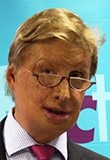 I was recently invited to speak on “new models of care” at a meeting of the All Party Parliamentary Group on Skin at the House of Commons. I chose to speak about a new approach to address the failure of the NHS to tackle the angst and distress felt by so many people with skin conditions like acne.
I was recently invited to speak on “new models of care” at a meeting of the All Party Parliamentary Group on Skin at the House of Commons. I chose to speak about a new approach to address the failure of the NHS to tackle the angst and distress felt by so many people with skin conditions like acne.
What is well recognised is that acne, like other common skin conditions, affects large numbers of people, those in adolescence and young adulthood primarily.
It is clear from many studies in the UK and other countries that acne makes everyone affected, even those with mild or short duration acne, vulnerable to social withdrawal, low self-esteem, diminished self-confidence, damaged body image, feelings of anger and embarrassment, depression and, on occasion, suicidal thoughts. [1]
According to Stefanie Williams, medical director of Eudelo (European Dermatology London), acne is taking a huge toll: “It is like an epidemic. We have so many sufferers [in this country]. It is important to acknowledge that it is a disease. It is not normal and not a rite of passage”
The burden on the NHS is uncalculated, but must be very significant because skin disease accounts for between 15% and 20% of a GP’s workload and it is the most frequent reason for patients to visit their GP with a new problem. Many with acne are referred to dermatologists for specialist advice and are prescribed a range of drugs and associated treatments. Psychodermatologists are now available too to identify and help patients manage the psychological and psychiatric stresses that may be contributing factors in causing acne.
But despite all these efforts, all too often, the treatments are only partially effective; the acne persists and can leave behind visual scars. People continue to struggle psychologically—and some do so for the rest of their lives. Which may add more to the NHS bill as they need help for other mental health problems.
At Changing Faces we think the current approach to treating acne is missing a crucial element, how to help people live confidently with acne, even if as is often the case, it cannot be cured and the residual disfigurement removed. We believe this would not only constitute comprehensive health care but it is also made all the more necessary because we live in a society which is obsessed by the importance of so-called “good looks.”
Importantly, we believe the same is true for many other facial conditions (such as burns, head and neck cancer, or Bell’s palsy).
In January this year I was invited to speak to a conference for the next generation of oral and maxillo-facial surgeons. They openly recognised that whilst their specialty is devising increasingly sophisticated techniques to managing the functional and aesthetic problems presented by their patients, they were not able in many cases to create perfect facial looks.
But, as with skin conditions, they had not addressed the question of how to help people live confidently with that reality.
We want a complete re-framing of disfigurement which tells the truth about this experience and acknowledges people’s needs to a comprehensive bio-psycho-social package of help.
Crucially, although the medical or surgical treatments for people with acne or facial cancer may be very different, the help to address their psycho-social concerns should be and can be very similar.
Changing Faces has evolved over the last 20+ years a unique package of psycho-social help for people with disfigurements, known as the FACES package. We train up Changing Faces Practitioners (CFPs) to deliver this. Our CFPs come from a variety of backgrounds in the caring professions such as nursing, social work, counselling, psychology and play therapy.
Successful adjustment to a disfigurement involves an individual and family having access to help (and/or social support) that enables them to gain the life-skills to manage it. The FACES package involves:
F FINDING OUT about their condition and its treatment
A Getting ‘ATTITUDE’, a positive outlook/belief about future
C COPING with feelings (anxiety, anger, loss, intimacy etc)
E EXCHANGING experiences with others
S SOCIAL SKILLS training to manage others’ reactions
FACES can be delivered by Changing Faces Practitioners and suitably trained health care professionals and be accessed in self-help format from our website and via a web based programme too.
Understanding that people with acne or other facial conditions often need help to be able to live confidently with their condition in our looks obsessed society is step one in the re-framing of disfigurement-related health care. This awareness needs to spread throughout primary care and into school health care too.
Step two is for a real commitment to be made to address these needs in a routine way—and we believe that our Changing Faces Practitioners can play a real part. CFPs can be in clinics alongside dermatologists, maxillofacial, oral and plastic surgeons, and in the GP practices accessible to patients and their families.
1. Fried, RG (2013) Acne Vulgaris: The Psychosocial & Psychological Burden Of Illness, The Dermatologist 21, 9, September 2013.
Changing Faces is a BMJ charity.
Competing interests: None declared.
James Partridge OBE is founder and chief executive of Changing Faces, the leading UK charity supporting and representing people with disfigurements (www.changingfaces.org.uk). He is also founding director of Dining with a Difference, a disability consultancy company.
